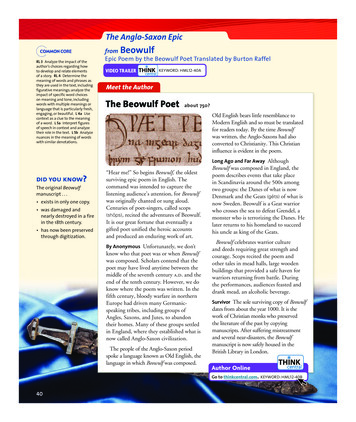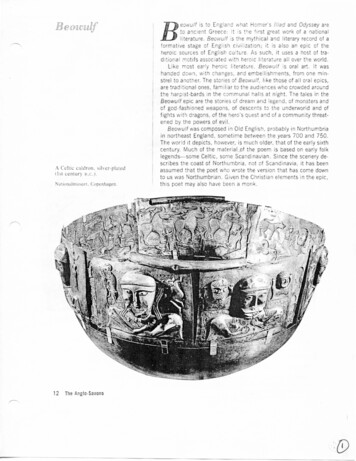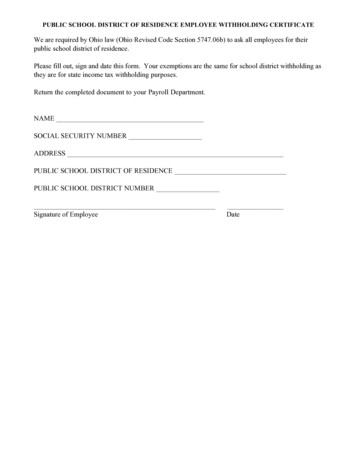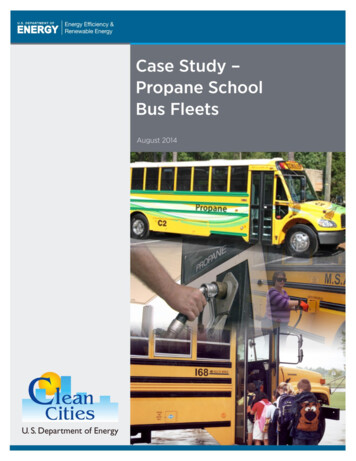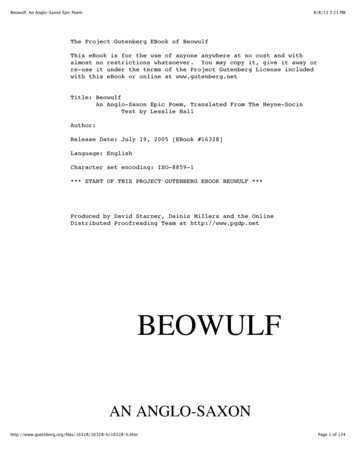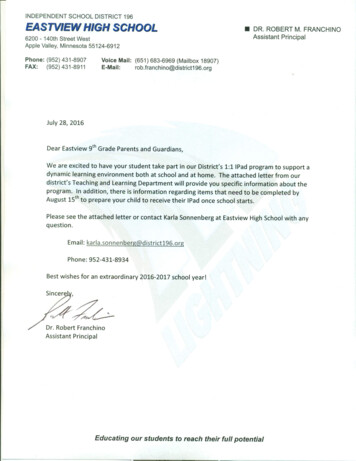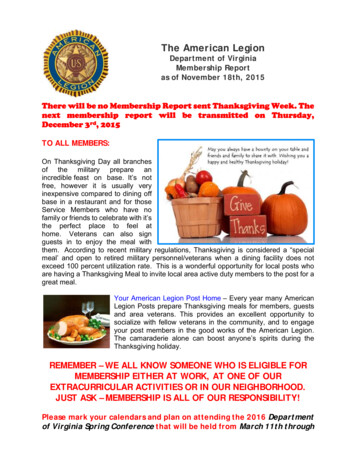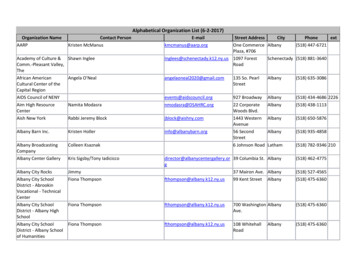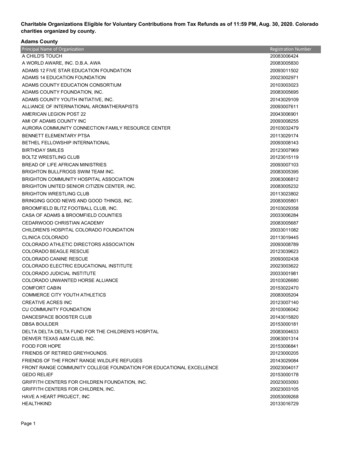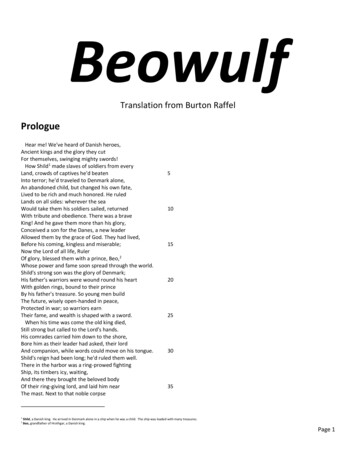
Transcription
BeowulfTranslation from Burton RaffelPrologueHear me! We've heard of Danish heroes,Ancient kings and the glory they cutFor themselves, swinging mighty swords!How Shild1 made slaves of soldiers from everyLand, crowds of captives he'd beatenInto terror; he'd traveled to Denmark alone,An abandoned child, but changed his own fate,Lived to be rich and much honored. He ruledLands on all sides: wherever the seaWould take them his soldiers sailed, returnedWith tribute and obedience. There was a braveKing! And he gave them more than his glory,Conceived a son for the Danes, a new leaderAllowed them by the grace of God. They had lived,Before his coming, kingless and miserable;Now the Lord of all life, RulerOf glory, blessed them with a prince, Beo,2Whose power and fame soon spread through the world.Shild's strong son was the glory of Denmark;His father's warriors were wound round his heartWith golden rings, bound to their princeBy his father's treasure. So young men buildThe future, wisely open-handed in peace,Protected in war; so warriors earnTheir fame, and wealth is shaped with a sword.When his time was come the old king died,Still strong but called to the Lord's hands.His comrades carried him down to the shore,Bore him as their leader had asked, their lordAnd companion, while words could move on his tongue.Shild's reign had been long; he'd ruled them well.There in the harbor was a ring-prowed fightingShip, its timbers icy, waiting,And there they brought the beloved bodyOf their ring-giving lord, and laid him nearThe mast. Next to that noble corpse125101520253035Shild, a Danish king. He arrived in Denmark alone in a ship when he was a child. The ship was loaded with many treasures.Beo, grandfather of Hrothgar, a Danish king.Page 1
They heaped up treasures, jeweled helmets,Hooked swords and coats of mail, armorCarried from the ends of the earth: no shipHad ever sailed so brightly fitted,No king sent forth more- deeply mourned.Forced to set him adrift, floatingAs far as the tide might run, they refusedTo give him less from their hoards of goldThan those who'd shipped him away, an orphanAnd a beggar, to cross the waves alone.High up over his head they flewHis shining banner, then sadly letThe water pull at the ship, watched itSlowly sliding to where neither rulersNor heroes nor anyone can say whose handsOpened to take that motionless cargo404550Chapter 1: Grendel Attacks the DanesThen Beo was king in that Danish castle,Shild's son ruling as long as his fatherAnd as loved, a famous lord of men.And he in turn gave his people a son,The great Healfdane, a fierce fighterWho led the Danes to the end of his longLife and left them four children,Three princes to guide them in battle, HergarAnd Hrothgar and Halga the Good, and one daughter,Yrs, who was given to Onela, kingOf the Swedes, and became his wife and their queen.Then Hrothgar, taking the throne, ledThe Danes to such glory that comrades and kinsmenSwore by his sword, and young men swelledHis armies, and he thought of greatness and resolvedTo build a hall3 that would hold his mightyBand and reach higher toward Heaven than anythingThat had ever been known to the sons of men.And in that hall he'd divide the spoilsOf their victories, to old and young what they'd earnedIn battle, but leaving the common pasturesUntouched, and taking no lives. The workWas ordered, the timbers tied and shapedBy the hosts that Hrothgar ruled. It was quicklyReady, that most beautiful of dwellings, builtAs he'd wanted, and then he whose word was obeyedAll over the earth named it Herot.His boast come true he commanded a banquet,Opened out his treasure-full hands.That towering place, gabled and huge,Stood waiting for time to pass, for warTo begin, for flames to leap as highAs the feud that would light them, and for Herot to burn,35560657075808568 hall: the Danish King Hrothgar’s mead hall, Herot.Page 2
A powerful monster, living downIn the darkness, growled in pain, impatientAs day after day the music rangLoud in that hall, the harp’s rejoicingCall and the poet’s clear songs, sungOf the ancient beginnings of us all, recallingThe Almighty making the earth, shapingThese beautiful plains marked off by oceans,Then proudly setting the sun and moonTo glow across the land and light it;The corners of the earth were made lovely with treesAnd leaves, made quick with life, with eachOf the nations who now move on its face. And thenAs now warriors sang of their pleasure:So Hrothgar’s men lived happy in his hallTill the monster stirred, that demon, that fiend,Grendel, who haunted the moors, the wildMarshes, and made his home in a hellNot hell but earth. He was spawned4 in that slime,Conceived by a pair of those monsters bornOf Cain,5 murderous creatures banishedBy God, punished forever for the crimeOf Abel’s death. The Almighty droveThose demons out, and their exile was bitter,Shut away from men; they splitInto a thousand forms of evil—spiritsAnd fiends, goblins, monsters, giants,A brood forever opposing the Lord’sWill, and again and again defeated.9095100105110Chapter 2Then, when darkness had dropped, GrendelWent up to Herot, wondering what the warriorsWould do in that hall when their drinking was done.He found them sprawled in sleep, suspectingNothing, their dreams undisturbed. The monster’sThoughts were as quick as his greed or his claws:He slipped through the door and there in the silenceSnatched up thirty men, smashed themUnknowing in their beds, and ran out with their bodies,The blood dripping behind him, backTo his lair,6 delighted with his night’s slaughter.At daybreak, with the sun’s first light, they sawHow well he had worked, and in that gray morningBroke their long feast with tears and laments7For the dead. Hrothgar, their lord, sat joylessIn Herot, a mighty prince mourningThe fate of his lost friends and companions,Knowing by its tracks that some demon had tornHis followers apart. He wept, fearing4104106125712856115120125130spawned: born. Usually, spawned refers to the production of young by fish, amphibians, or other water-dwelling creatures.Cain: According to the Bible (Genesis 4:8), Cain, the eldest son of Adam and Eve, murdered his brother Abel.lair: den of a wild animal.lament: (n.) expression of sorrow; song or literary composition that mourns a loss or death.Page 3
The beginning might not be the end. And that nightGrendel came again, so setOn murder that no crime could ever be enough,No savage assault quench his lustFor evil. Then each warrior triedTo escape him, searched for rest in differentBeds, as far from Herot as they could find,Seeing how Grendel hunted when they slept.Distance was safety; the only survivorsWere those who fled him. Hate had triumphed.So Grendel ruled, fought with the righteous,One against many, and won; so HerotStood empty, and stayed deserted for years,Twelve winters of grief for Hrothgar, kingOf the Danes, sorrow heaped at his doorBy hell-forged8 hands. His misery leapedThe seas, was told and sung in allMen’s ears: how Grendel’s hatred began,How the monster relished his savage warOn the Danes, keeping the bloody feudAlive, seeking no peace, offeringNo truce, accepting no settlement, no priceIn gold or land, and paying the livingFor one crime only with another. No oneWaited for reparation from his plundering claws:That shadow of death hunted in the darkness,Stalked Hrothgar’s warriors, oldAnd young, lying in waiting, hiddenIn mist, invisibly following them from the edgeOf the marsh, always there, unseen.So mankind’s enemy continued his crimes,Killing as often as he could, comingAlone, bloodthirsty and horrible. Though he livedIn Herot, when the night hid him, he neverDared to touch king Hrothgar’s gloriousThrone, protected by God—God,Whose love Grendel could not know. But Hrothgar’sHeart was bent. The best and most nobleOf his council debated remedies, satIn secret sessions, talking of terrorAnd wondering what the bravest of warriors could do.And sometimes they sacrificed to the old stone gods,Made heathen vows, hoping for Hell’sSupport, the Devil’s guidance in drivingTheir affliction off. That was their way,And the heathen’s only hope, HellAlways in their hearts, knowing neither GodNor His passing as He walks through our world, the LordOf Heaven and earth; their ears could not hearHis praise nor know His glory. Let themBeware, those who are thrust into danger,Clutched at by trouble, yet can carry no solaceIn their hearts, cannot hope to be better! Hail8135140145150155160165170175180185149 forged: (adj.) formed or shaped, often with blows or pressure after heatingPage 4
To those who will rise to God, drop offTheir dead bodies, and seek our Father’s peace!Chapter 3: The Coming of BeowulfSo the living sorrow of Healfdane’s son9Simmered, bitter and fresh, and no wisdomOr strength could break it: That agony hungOn king and people alike, harshAnd unending, violent and cruel, and evil.In his far-off home Beowulf, Higlac’sFollower10 and the strongest of the Geats—greaterAnd stronger than anyone anywhere in this world—Heard how Grendel filled nights with horrorAnd quickly commanded a boat fitted out,Proclaiming that he’d go to that famous king,Would sail across the sea to Hrothgar,Now when help was needed. NoneOf the wise ones regretted his going, muchAs he was loved by the Geats: The omens were good,And they urged the adventure on. So BeowulfChose the mightiest men he could find,The bravest and best of the Geats, fourteenIn all, and led them down to their boat;He knew the sea, would point the prow11Straight to that distant Danish shore.Then they sailed, set their shipOut on the waves, under the cliffs.Ready for what came they wound through the currents,The seas beating at the sand, and were borneIn the lap of their shining ship, linedWith gleaming armor, going safelyIn that oak-hard boat to where their hearts took them.The wind hurried them over the waves,The ship foamed through the sea like a birdUntil, in the time they had known it would take,Standing in the round-curled prow they could seeSparkling hills, high and greenJutting up over the shore, and rejoicingIn those rock-steep cliffs they quietly endedTheir voyage. Jumping to the ground, the GeatsPushed their boat to the sand and tied itIn place, mail shirts12 and armor rattlingAs they swiftly moored their ship. And thenThey gave thanks to God for their easy crossing.High on a wall a Danish watcherPatrolling along the cliffs sawThe travelers crossing to the shore, their shieldsRaised and shining; he came riding down,Hrothgar’s lieutenant, spurring his horse,Needing to know why they’d landed, these men1901952002052102152202252309189 Healfdane’s son: Hrothgar.195-196 Higlac’s Follower: Hilac, king of the Geats, is Beowulf’s uncle. Higlacs’s follower, then, refers to Beowulf.208 prow: the bow, or forwardmost part of the ship.12226 mail shirts: a type of flexible body armor usually made of linked metal loops.1011Page 5
In armor. Shaking his heavy spearIn their faces he spoke:“Whose soldiers are you,You who’ve been carried in your deep-keeled ship13Across the sea-road to this country of mine?Listen! I’ve stood on these cliffs longerThan you know, keeping our coast freeOf pirates, raiders sneaking ashoreFrom their ships, seeking our lives and our gold.None have ever come more openly—And yet you’ve offered no password, no signFrom my prince, no permission from my people for yourlandingHere. Nor have I ever seen,Out of all the men on earth, one greaterThan has come with you; no commoner carriesSuch weapons, unless his appearance, and his beautyAre both lies. You! Tell me your name,And your father’s; no spies go further onto DanishSoil than you’ve come already. Strangers,From wherever it was you sailed, tell it,And tell it quickly, the quicker the better,I say, for us all. Speak, sayExactly who you are, and from where, and why.”235240245250255Chapter 4Their leader answered him, Beowulf unlockingWords from deep in his breast:“We are Geats,Men who follow Higlac. My fatherWas a famous soldier, known far and wideAs a leader of men. His name was Edgetho.His life lasted many winters;Wise men all over the earth surelyRemember him still. And we have come seekingYour prince, Healfdane’s son, protectorOf this people, only in friendship: instruct us,Watchman, help us with your words! Our errandIs a great one, our business with the glorious kingOf the Danes no secret; there’s nothing darkOr hidden in our coming. You know (if we’ve heardThe truth, and been told honestly) that your countryIs cursed with some strange, vicious creatureThat hunts only at night and that no oneHas seen. It’s said, watchman, that he has slaughteredYour people, brought terror to the darkness. PerhapsHrothgar can hunt, here in my heart,For some way to drive this devil out—If anything will ever end the evilsAfflicting your wise and famous lord.Here he can cool his burning sorrow.Or else he may see his suffering go on13260265270275280238 deep-keeled ship: a ship that possesses a deep bottom-the keel being the main piece of timber that runs the length of the bottom of a boat to support the ship’s home.Page 6
Forever, for as long as Herot towersHigh on your hills.”The mounted officerAnswered him bluntly, the brave watchman:“A soldier should know the difference between wordsAnd deeds, and keep that knowledge clearIn his brain. I believe your words, I trust inYour friendship. Go forward, weapons and armorAnd all, on into Denmark. I’ll guide youMyself—and my men will guard your ship,Keep it safe here on our shores,Your fresh-tarred boat, watch it well,Until that curving prow carriesAcross the sea to Geatland a chosenWarrior who bravely does battle with the creatureHaunting our people, who survives that horrorUnhurt, and goes home bearing our love.”Then they moved on. Their boat lay moored,Tied tight to its anchor. Glittering at the topOf their golden helmets wild boar heads gleamed,Shining decorations, swinging as they marched,Erect like guards, like sentinels, as though readyTo fight. They marched, Beowulf and his menAnd their guide, until they could see the gablesOf Herot, covered with hammered goldAnd glowing in the sun—that most famous of all dwellings,Towering majestic, its glittering roofsVisible far across the land.Their guide reined in his horse, pointingTo that hall, built by Hrothgar for the bestAnd bravest of his men; the path was plain,They could see their way.285290295300305310315Chapter 6: The Arrival of a HeroThen Wulfgar14 went to the door and addressedThe waiting seafarers with soldier’s words:“My lord, the great king of the Danes, commands meTo tell you that he knows of your noble birthAnd that having come to him from over the openSea you have come bravely and are welcome.Now go to him as you are, in your armor and helmets,But leave your battle-shields here, and your spears,Let them lie waiting for the promises your wordsMay make.”Beowulf arose, with his menAround him, ordering a few to remainWith their weapons, leading the others quicklyAlong under Herot’s steep roof into Hrothgar’sPresence. Standing on that prince’s own hearth,Helmeted, the silvery metal of his mail shirtGleaming with a smith’s high art, he greeted14390395400405389 Wulfar: the Watchman who guided Beowulf and his men from the coast to the mead-hall, Herot.Page 7
The Danes’ great lord:“Hail, Hrothgar!Higlac is my cousin15 and my king; the daysOf my youth have been filled with glory. Now Grendel’sName has echoed in our land: SailorsHave brought us stories of Herot, the bestOf all mead-halls, deserted and useless when the moonHangs in skies the sun had lit,Light and life fleeing together.My people have said, the wisest, most knowingAnd best of them, that my duty was to go to the Danes’Great king. They have seen my strength for themselves,Have watched me rise from the darkness of war,Dripping with my enemies’ blood. I droveFive great giants into chains, chasedAll of that race from the earth. I swamIn the blackness of night, hunting monstersOut of the ocean, and killing them oneBy one; death was my errand and the fateThey had earned. Now Grendel and I are calledTogether, and I’ve come. Grant me, then,Lord and protector of this noble place,A single request! I have come so far,Oh shelterer of warriors and your people’s loved friend,That this one favor you should not refuse me—That I, alone and with the help of my men,May purge all evil from this hall. I have heard,Too, that the monster’s scorn of menIs so great that he needs no weapons and fears none.Nor will I. My lord HiglacMight think less of me if I let my swordGo where my feet were afraid to, if I hidBehind some broad linden shield:16 My handsAlone shall fight for me, struggle for lifeAgainst the monster. God must decideWho will be given to death’s cold grip.Grendel’s plan, I think, will beWhat it has been before, to invade this hallAnd gorge his belly with our bodies. If he can,If he can. And I think, if my time will have come,There’ll be nothing to mourn over, no corpse to prepareFor its grave: Grendel will carry our bloodyFlesh to the moors, crunch on our bones,And smear torn scraps of our skin on the wallsOf his den. No, I expect no DanesWill fret about sewing our shrouds,17 if he wins.And if death does take me, send the hammeredMail of my armor to Higlac, returnThe inheritance I had from Hrethel,18 and heFrom Wayland.19 Fate will unwind as it 5440445450455cousin: meaning “relative.” Higlac is Beowulf’s uncle and feudal lord.linden shield: shield made of wool of the linden tree.shrouds: cloths used to wrap a body for burial.Hrethel: Beowulf’s grandfather, former king of the Geats.Wayland: a smith celebrated for his wonderful workmanship in making swords and shirts of ringed metal (mail shirts).Page 8
Chapter 7Hrothgar replied, protector of the Danes:“Beowulf, you’ve come to us in friendship, andbecauseOf the reception your father found at our court.Edgetho had begun a bitter feud,Killing Hathlaf, a Wulfing warrior:20Your father’s countrymen were afraid of war,If he returned to his home, and they turned him away.Then he traveled across the curving wavesTo the land of the Danes. I was new to the throne,Then, a young man ruling this wideKingdom and its golden city: Hergar,My older brother, a far better manThan I, had died and dying made me,Second among Healfdane’s sons, firstIn this nation. I bought the end of Edgetho’sQuarrel, sent ancient treasures through the ocean’sFurrows to the Wulfings; your father sworeHe’d keep that peace. My tongue grows heavy,And my heart, when I try to tell you what GrendelHas brought us, the damage he’s done, hereIn this hall. You see for yourself how much smallerOur ranks have become, and can guess what we’ve lostTo his terror. Surely the Lord AlmightyCould stop his madness, smother his lust!How many times have my men, glowingWith courage drawn from too many cupsOf ale, sworn to stay after darkAnd stem that horror with a sweep of their swords.And then, in the morning, this mead-hall glitteringWith new light would be drenched with blood, thebenchesStained red, the floors, all wet from that fiend’sSavage assault—and my soldiers would be fewerStill, death taking more and more.But to table, Beowulf, a banquet in your honor:Let us toast your victories, and talk of the future.”Then Hrothgar’s men gave places to the Geats,Yielded benches to the brave visitors,And led them to the feast. The keeper of the meadCame carrying out the carved flasks,And poured that bright sweetness. A poetSang, from time to time, in a clearPure voice. Danes and visiting GeatsCelebrated as one, drank and rejoiced.20460465470475480485490495460 Wulfing warrior: the Wulfings were a Germanic tribe. Hrothgar’s queen might have been a Wulfing.Page 9
Chapter 8: Unferth’s ChallengeUnferth21 spoke, Ecglaf’s son,Who sat at Hrothgar’s feet, spoke harshlyAnd sharp (vexed by Beowulf’s adventure,By their visitor’s courage, and angry that anyoneIn Denmark or anywhere on earth had everAcquired glory and fame greaterThan his own):“You’re Beowulf, are you—the sameBoastful fool who fought a swimmingMatch with Brecca, both of you daringAnd young and proud, exploring the deepestSeas, risking your lives for no reasonBut the danger? All older and wiser heads warned youNot to, but no one could check such pride.With Brecca at your side you swam alongThe sea-paths, your swift-moving hands pulling youOver the ocean’s face. Then winterChurned through the water, the waves ran youAs they willed, and you struggled seven long nightsTo survive. And at the end victory was his,Not yours. The sea carried him closeTo his home, to southern Norway, nearThe land of the Brondings, where he ruled and wasloved,Where his treasure was piled and his strengthprotectedHis towns and his people. He’d promised to outswimyou:Bonstan’s son22 made that boast ring true.You’ve been lucky in your battles, Beowulf, but I thinkYour luck may change if you challenge Grendel,Staying a whole night through in this hall,Waiting where that fiercest of demons can find you.”Beowulf answered, Edgetho’s great son:“Ah! Unferth, my friend, your faceIs hot with ale, and your tongue has triedTo tell us about Brecca’s doings. But the truthIs simple: No man swims in the seaAs I can, no strength is a match for mine.As boys, Brecca and I had boasted—We were both too young to know better—that we’d riskOur lives far out at sea, and soWe did. Each of us carried a nakedSword, prepared for whales or the swiftSharp teeth and beaks of needlefish.He could never leave me behind, swim fasterAcross the waves than I could, and IHad chosen to remain close to his side.2122500505510515520525530535540499 Unferth: A Danish warrior who is jealous of Beowulf is unwilling or unable to fight Grendel himself, thus proving himself inferior to Beowulf524 Bonstan’s son: Brecca’s father was Bonstan.Page 10
I remained near him for five long nights,Until a flood swept us apart;The frozen sea surged around me,It grew dark, the wind turned bitter, blowingFrom the north, and the waves were savage. CreaturesWho sleep deep in the sea were stirredInto life—and the iron hammered linksOf my mail shirt, these shining bits of metalWoven across my breast, saved meFrom death. A monster seized me, drew meSwiftly toward the bottom, swimming with its clawsTight in my flesh. But fate let meFind its heart with my sword, hack myselfFree; I fought that beast’s last battle,Left it floating lifeless in the sea.545550555Chapter 9“Other monsters crowded around me,Continually attacking. I treated them politely,Offering the edge of my razor-sharp sword.But the feast, I think, did not please them, filledTheir evil bellies with no banquet-rich food,Thrashing there at the bottom of the sea;By morning they’d decided to sleep on the shore,Lying on their backs, their blood spilled outOn the sand. Afterwards, sailors could crossThat sea-road and feel no fear; nothingWould stop their passing. Then God’s bright beaconAppeared in the east, the water lay still,And at last I could see the land, wind-sweptCliff-walls at the edge of the coast. Fate savesThe living when they drive away death by themselves!Lucky or not, nine was the numberOf sea-huge monsters I killed. What man,Anywhere under Heaven’s high arch, has foughtIn such darkness, endured more misery, or been harderPressed? Yet I survived the sea, smashedThe monsters’ hot jaws, swam home from my journey.The swift-flowing waters swept me alongAnd I landed on Finnish soil. I’ve heardNo tales of you, Unferth, tellingOf such clashing terror, such contests in the night!Brecca’s battles were never so bold;Neither he nor you can match me—and I meanNo boast, have announced no more than I knowTo be true. And there’s more: You murdered yourbrothers,Your own close kin. Words and bright witWon’t help your soul; you’ll suffer hell’s fires,Unferth, forever tormented. Ecglaf’sProud son, if your hands were as hard, your heartAs fierce as you think it, no fool would dareTo raid your hall, ruin HerotAnd oppress its prince, as Grendel has done.But he’s learned that terror is his alone,560565570575580585590595Page 11
Discovered he can come for your people with no fearOf reprisal; he’s found no fighting, here,But only food, only delight.He murders as he likes, with no mercy, gorgesAnd feasts on your flesh, and expects no trouble,No quarrel from the quiet Danes. NowThe Geats will show him courage, soonHe can test his strength in battle. And when the sunComes up again, opening anotherBright day from the south, anyone in DenmarkMay enter this hall: That evil will be gone!”Hrothgar, gray-haired and brave, sat happilyListening, the famous ring-giver sure,At last, that Grendel could be killed; he believedIn Beowulf’s bold strength and the firmness of hisspirit.There was the sound of laughter, and the cheerful clankingOf cups, and pleasant words. Then Welthow,Hrothgar’s gold-ringed queen, greetedThe warriors; a noble woman who knewWhat was right, she raised a flowing cupTo Hrothgar first, holding it highFor the lord of the Danes to drink, wishing himJoy in that feast. The famous kingDrank with pleasure and blessed their banquet.Then Welthow went from warrior to warrior,Pouring a portion from the jeweled cupFor each, till the bracelet-wearing queenHad carried the mead-cup among them and it wasBeowulf’sTurn to be served. She saluted the Geats’Great prince, thanked God for answering her prayers,For allowing her hands the happy dutyOf offering mead to a hero who would helpHer afflicted people. He drank what she poured,Edgetho’s brave son, then assured the DanishQueen that his heart was firm and his handsReady:“When we crossed the sea, my comradesAnd I, I already knew that allMy purpose was this: to win the good willOf your people or die in battle, pressedIn Grendel’s fierce grip. Let me live in greatnessAnd courage, or here in this hall welcomeMy death!”Welthow was pleased with his words,His bright-tongued boasts; she carried them backTo her lord, walked nobly across to his side.The feast went on, laughter and musicAnd the brave words of warriors celebratingTheir delight. Then Hrothgar rose, Healfdane’sSon, heavy with sleep; as soonAs the sun had gone, he knew that GrendelWould come to Herot, would visit that hallWhen night had covered the earth with its netAnd the shapes of darkness moved black and silent600605610615620625630635640645Page 12
Through the world. Hrothgar’s warriors rose with him.He went to Beowulf, embraced the Geats’Brave prince, wished him well, and hopedThat Herot would be his to command. And thenHe declared:23“No one strange to this landHas ever been granted what I’ve given you,No one in all the years of my rule.Make this best of all mead-halls yours, and thenKeep it free of evil, fightWith glory in your heart! Purge HerotAnd your ship will sail home with its treasure-holdsfull.”650655660Chapter 10The feast ends. Beowulf and his men take the place at Hrothgar’s followers and lie down to sleep in Herot. Bewoulf, however, iswakeful, eager to meet his enemy. Beowulf removes his gear and armor, ordering his gear to be guarded till morning.Chapter 11: The Battle with GrendelOut from the marsh, from the foot of mistyHills and bogs, bearing God’s hatred,Grendel came, hoping to killAnyone he could trap on this trip to high Herot.He moved quickly through the cloudy night,Up from his swampland, sliding silentlyToward that gold-shining hall. He had visited Hrothgar’sHome before, knew the way—But never, before nor after that night,Found Herot defended so firmly, his receptionSo harsh. He journeyed, forever joyless,Straight to the door, then snapped it open,Tore its iron fasteners with a touch,And rushed angrily over the threshold.He strode quickly across the inlaidFloor, snarling and fierce: His eyesGleamed in the darkness, burned with a gruesomeLight. Then he stopped, seeing the hallCrowded with sleeping warriors, stuffedWith rows of young soldiers resting together.And his heart laughed, he relished the sight,Intended to tear the life from those bodiesBy morning; the monster’s mind was hotWith the thought of food and the feasting his bellyWould soon know. But fate, that night, intendedGrendel to gnaw the broken bonesOf his last human supper. HumanEyes were watching his evil steps,Waiting to see his swift hard claws.Grendel snatched at the first Geat23710715720725730735655 Hrothgar speaking.Page 13
He came to, ripped him apart, cutHis body to bits with powerful jaws,Drank the blood from his veins, and boltedHim down, hands and feet; deathAnd Grendel’s great teeth came together,Snapping life shut. Then he stepped to anotherStill body, clutched at Beowulf with his claws,Grasped at a strong-hearted wakeful sleeper—And was instantly seized himself, clawsBent back as Beowulf leaned up on one arm.That shepherd of evil, guardian of crime,Knew at once that nowhere on earthHad he met a man whose hands were harder;His mind was flooded with fear—but nothingCould take his talons24 and himself from that tightHard grip. Grendel’s one thought was to runFrom Beowulf, flee back to his marsh and hide there:This was a different Herot than the hall he had emptied.But Higlac’s follower remembered his finalBoast and, standing erect, stoppedThe monster’s flight, fastened those clawsIn his fists till they cracked, clutched GrendelCloser. The infamous25 killer foughtFor his freedom, wanting no flesh but retreat,Desiring nothing but escape; his clawsHad been caught, he was trapped. That trip to HerotWas a miserable journey for the writhing26 monster!The high hall rang, its roof boards swayed,And Danes shook with terror. DownThe aisles the battle swept, angryAnd wild. Herot trembled, wonderfullyBuilt to withstand the blows, the strugglingGreat bodies beating at its beautiful walls;Shaped and fastened with iron, insideAnd out, artfully worked, the buildingStood firm. Its benches rattled, fellTo the floor, gold-covered boards gratingAs Grendel and Beowulf battled across them.Hr
Conceived by a pair of those monsters born 105 Of Cain,5 murderous creatures banished By God, punished forever for the crime Of Abel’s death. The Almighty drove Those demons out, and their exile was bitter, Shut away from men; they split 110 Into a thousand forms of evil—spirit

